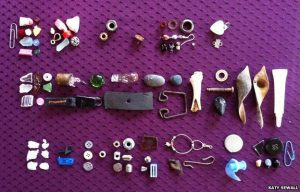I don’t tend to browse many websites, but one I go to every day is the BBC News (I am English, after all). And there I came upon this piece about a young girl and her crows in Seattle. This all started by accident; being a somewhat messy eater, some of the food Gabi had been eating on her way home from preschool would fall from her lap to the ground. Waiting crows would swoop down to feed on those crumbs. Gabi then decided to feed the crows on a more regular basis, and every day would put out food and water for them.
Pretty soon she discovered that the crows were leaving things for her—things that they had found elsewhere. They were all sorts of things—a broken light bulb, beads, jewelry, a rusty nail, a tiny piece of metal with “best” written on it—basically, anything small enough to fit into a crow’s mouth. Gabi now has quite a collection, all neatly sorted, bagged, and labeled.
It seems quite likely that the crows are expressing their gratitude to Gabi.
Children, you’ve probably noticed, aren’t very much like crows. For one thing, they don’t fly. But they do express their gratitude in various ways. A lot of parents work really hard to get their children to say “thank you” when receiving help or a gift. That’s great, but of course some children only say it when prompted and others do it just out of politeness. Politeness is great, but it would also be good if the children had a warm and positive feeling about the person who had helped or given them something.
Some children behave as crows do. They receive a gift from someone, and their parents encourage them to provide a gift in return. So the children think about something that they themselves would like; they don’t think very much about the person to whom the gift is intended. Like the crows, these children recognize that someone has gone out of their way to get them something nice and they want to give something back to express their gratitude.
But as parents, we can do better, I think. We can encourage our children not to think so much about the gift or help they’ve received but about the person providing that gift. For example, when children recognize that they’ve received important help or a nice gift from someone and want to give back in some way, we could influence them to consider what that person might want in return: “Wasn’t that nice of your friend. I wonder if there’s something that we could do for her that would let her know how thankful you are.”
Perhaps Hitchcock was wrong in his famous film—Gabi’s crows are lovely. But let’s encourage our children to be more than crows.
The link to the full story is: http://www.bbc.com/news/magazine-31604026 The photos are from that story.


